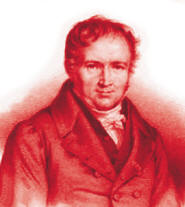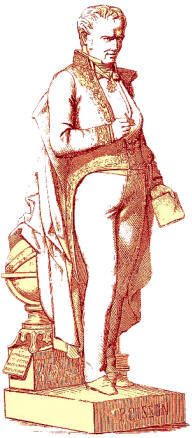Siméon Denis Poisson (1781 - 1840)
 Siméon-Denis Poisson's parents were not from the nobility and, although
it was becoming increasingly difficult to distinguish between the nobility and
the bourgeoisie in France in the years prior to the French Revolution, the class
system still had a major influence on his early years. Siméon-Denis was eight
years old when the Parisian insurrection of 14 July 1789 heralded the start
of the French Revolution. As might be expected of someone who had suffered discrimination
at the hands of the nobility, his father was enthusiastic about the political
turn of events.
Siméon-Denis Poisson's parents were not from the nobility and, although
it was becoming increasingly difficult to distinguish between the nobility and
the bourgeoisie in France in the years prior to the French Revolution, the class
system still had a major influence on his early years. Siméon-Denis was eight
years old when the Parisian insurrection of 14 July 1789 heralded the start
of the French Revolution. As might be expected of someone who had suffered discrimination
at the hands of the nobility, his father was enthusiastic about the political
turn of events.
One immediate consequence for his support of the Revolution was the fact that he became president of the district of Pithiviers which is in central France, about 80 km south of Paris. From this position he was able to influence the future career of his son. Poisson's father decided that the medical profession would provide a secure future for his son. An uncle of Poisson's was a surgeon in Fontainebleau and Siméon-Denis was sent there to become an apprentice surgeon. However, he soon found that he was ill suited to be a surgeon.
Times were changing quite quickly in France which was by this time a republic. No longer were certain professions controlled by the nobility as they had been and there had been moves towards making education available to everyone. In 1796 Poisson was sent back to Fontainebleau by his father to École Centrale. His teachers at the École Centrale were extremely impressed and encouraged him to go to École Polytechnique in Paris.Few people can have achieved academic success as quickly as Poisson did. When he began to study mathematics in 1798 at École Polytechnique he was therefore in a strong position to cope with the rigors of a hard course, yet overcome the deficiencies of his early education. His main weakness was the lack of coordination which had made a career as a surgeon impossible. This was still a drawback to him in some respects for drawing mathematical diagrams was quite beyond him.
 His teachers Laplace and Lagrange quickly saw his mathematical talents. They
were to become friends for life with their extremely able young student. However,
Poisson found that descriptive geometry, an important topic at École Polytechnique,
was impossible for him to succeed with because of his inability to draw diagrams.
This would have been an insurmountable problem had he been going into public
service, but those aiming at a career in pure science could be excused the drawing
requirements, and Poisson was not held back.
His teachers Laplace and Lagrange quickly saw his mathematical talents. They
were to become friends for life with their extremely able young student. However,
Poisson found that descriptive geometry, an important topic at École Polytechnique,
was impossible for him to succeed with because of his inability to draw diagrams.
This would have been an insurmountable problem had he been going into public
service, but those aiming at a career in pure science could be excused the drawing
requirements, and Poisson was not held back.
Poisson was named deputy professor at the École Polytechnique in 1802, a position he held until 1806 when he was appointed to the professorship at the École Polytechnique when Fourier was sent by Napoleon to Grenoble. In fact Poisson had little time for politics and all his energy was focused to support mathematics, science, education and the École Polytechnique. When the students at the École had been about to publish an attack on Napoleon's ideas for the Grand Empire in 1804, Poisson had managed to stop them, not because he supported Napoleon's views but rather because he saw that the students would damage the École Polytechnique by their actions. Poisson's motives were not understood by Napoleon's administration, however, and they saw Poisson as a supporter which did his career no harm at all.
During this period Poisson studied problems relating to ordinary differential equations and partial differential equations. In particular he studied applications to a number of physical problems such as the pendulum in a resisting medium and the theory of sound. Poisson was content to remain totally unfamiliar with the vicissitudes of experimental research. It is quite unlikely that he ever attempted an experimental measurement, nor did he try his hand at drafting experimental designs. In addition to his professorship at the École Polytechnique, in 1808 Poisson became an astronomer at Bureau des Longitudes. In 1809 he added another appointment, namely that of the chair of mechanics in the newly opened Faculté des Sciences. In 1808 and 1809 Poisson published three important papers with the Academy of Sciences. In the first 'Sur les inégalités des moyens mouvements des planètes'.
His approach to these problems was to use series expansions to derive approximate solutions. The other two papers, 'Sur le mouvement de rotation de la terre' and 'Sur la variation des constantes arbitraires dans les questions de mécanique' were a direct consequence of developments in Lagrange's method of variation of arbitrary constants which had been inspired by Poisson's 1808 paper. In 1813 Poisson studied the potential in the interior of attracting masses, producing results which would find application in electrostatics. He produced major work on electricity and magnetism, followed by work on elastic surfaces. Papers followed on the velocity of sound in gasses, on the propagation of heat, and on elastic vibrations. In 1815 he published a work on heat which annoyed Fourier who wrote: Poisson has too much talent to apply it to the work of others. To use it to discover what is already known is to waste it ...
Fourier went on to make valid objections to Poisson's arguments which he corrected in later memoirs of 1820 and 1821. In 1823 Poisson published on heat, producing results which influenced Sadi Carnot. Much of Poisson's work was motivated by results of Laplace, in particular his work on the relative velocity of sound and his work on attractive forces. In 'Recherches sur la probabilité des jugements en matière criminelle et matière civile' an important work on probability published in 1837, the Poisson distribution first appears. The Poisson distribution describes the probability that a random event will occur in a time or space interval under the conditions that the probability of the event occurring is very small, but the number of trials is very large so that the event actually occurs a few times. He also introduced the expression "law of large numbers." Although we now rate this work as of great importance, it found little favor at the time, the exception being in Russia where Chebyshev developed his ideas.
Poisson published between 300 and 400 mathematical works in all. Despite this exceptionally large output, he worked on one topic at a time. Poisson's name is attached to a wide variety of ideas, for example:- Poisson's integral, Poisson's equation in potential theory, Poisson brackets in differential equations, Poisson's ratio in elasticity, and Poisson's constant in electricity. However, he was not highly regarded by other French mathematicians either during his lifetime or after his death. His reputation was guaranteed by the esteem that he was held in by foreign mathematicians who seemed more able than his own colleagues to recognize the importance of his ideas. Poisson himself was completely dedicated to mathematics. Arago reported that Poisson frequently said:
Life is good for only two things, discovering mathematics and teaching mathematics.

Connect with us
Contact us today